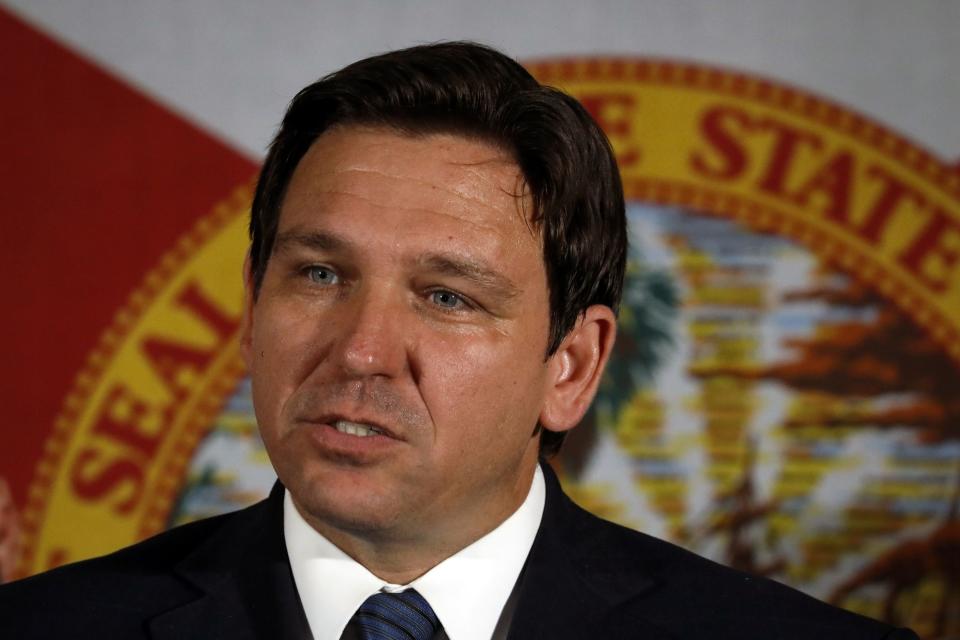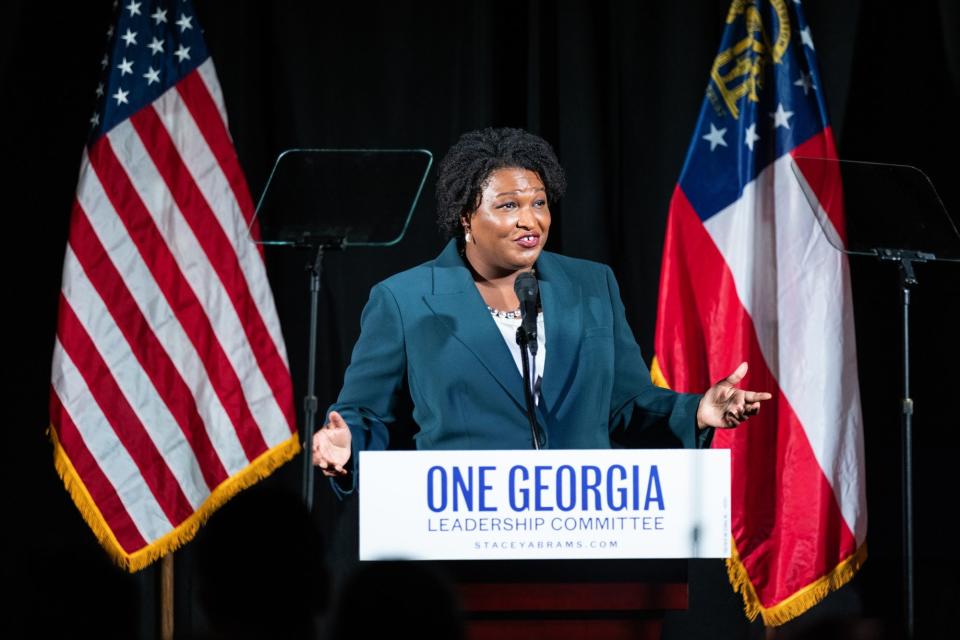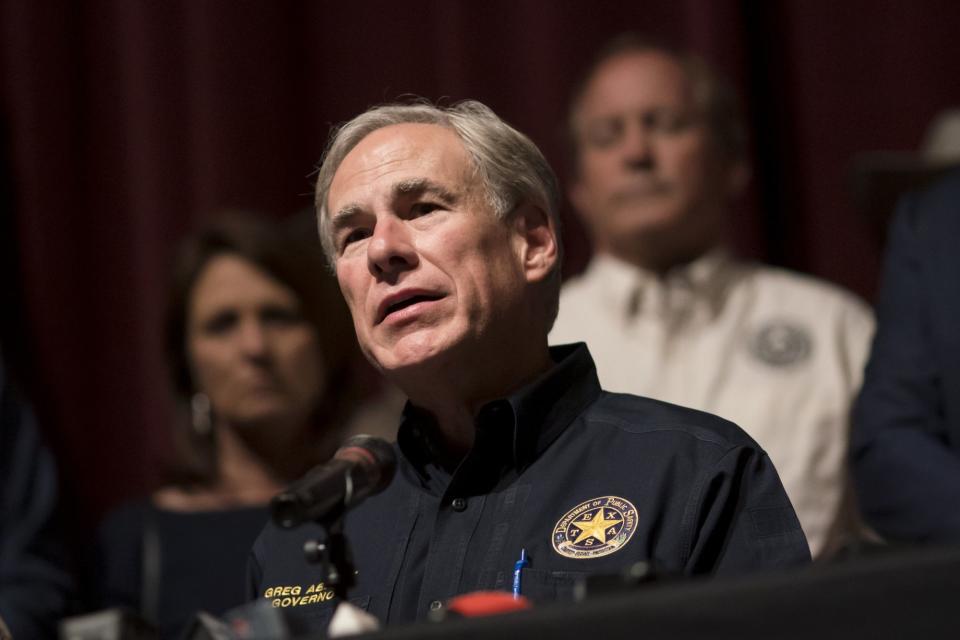Governor Races Take On New Urgency With More Powers in State Hands
- Oops!Something went wrong.Please try again later.
- Oops!Something went wrong.Please try again later.
- Oops!Something went wrong.Please try again later.
- Oops!Something went wrong.Please try again later.
- Oops!Something went wrong.Please try again later.
- Oops!Something went wrong.Please try again later.
(Bloomberg) -- The 36 US governor races on Tuesday have taken on new significance this election cycle as voters head to the polls split on everything from guns to immigration and abortion rights.
Most Read from Bloomberg
Sam Bankman-Fried’s $16 Billion Fortune Is Eviscerated in Days
Sam Bankman-Fried Bows to Rescue From Binance’s CZ as FTX Buckles
Putin's Elite Tremble as Hardliners Call for ‘Stalinist’ Steps
Elon Musk Tells Twitter Followers to Vote for a Republican Congress
New York’s first female governor, Kathy Hochul, has seen her double-digit lead against Republican opponent Lee Zeldin dramatically narrow in the final weeks before the election, while the fight for the top office in Georgia has become one of the country’s most closely watched races.
The results of contests featuring Republican Florida Governor Ron DeSantis and California Democratic Governor Gavin Newsom will provide possible clues to the 2024 presidential election. Both are believed to be considering runs for the White House.
Races have become polarized even in usually overlooked states like Oregon, which could see the election of its first Republican governor in more than three decades. In Arizona, Republican Kari Lake has burst into the scene embracing former President Donald Trump’s baseless claims of widespread fraud in the 2020 election.
There are 36 gubernatorial races. Here is a guide to elections in key states:
New York
Hochul is facing a test of her 14-month tenure in power. The Democratic candidate’s once double-digit lead against Zeldin has narrowed dramatically in recent weeks.
A Buffalo native and former congresswoman, Hochul became governor in 2021 after Andrew Cuomo’s abrupt resgination. As she sought to steady the state’s course, her administration failed to score the striking achievement of previous New York governors, who made bold decisions including legalizing same-sex marriage years before it was federally recognized.
The state, where Democrats make up about half of the 12 million active voters, hasn’t had a Republican leader in 16 years, but Zeldin, a US representative from Long Island, has gained ground by positioning himself as the anti-crime candidate and emphasizing economic issues.
Georgia
In one of the most closely watched races, Republican Governor Brian Kemp is seeking re-election, facing Democratic opponent Stacey Abrams for a second time.
Abrams trailed Kemp in poll after poll, but a surge in Black participation in early voting could bolster her chances this time around. If elected, she would be the first Black female governor in the US and Georgia’s first Democratic leader in 20 years.
Kemp is running on his record on the economy, including ending pandemic business shutdowns earlier than other states and bringing large economic development projects to Georgia.
The rematch has been closely followed in large part because of Abrams’s national stature as a voting activist and her role in delivering Georgia to Democrats in 2020. She narrowly lost to Kemp in 2018.
Florida
Florida’s battle between DeSantis and Democratic challenger Charlie Crist could have national implications. While DeSantis hasn’t said he plans to run for president in 2024, he has popped up in polls as GOP voters’ preferred candidate should Trump decide against running.
DeSantis, who secured the support of billionaire Citadel founder Ken Griffin and other top Wall Street donors, remained firmly ahead in polls throughout the campaign. He has clashed with President Joe Biden over Covid vaccine and mask mandates, and sought to highlight what he calls the failure of the president’s immigration policy by using taxpayer money to fly dozens of Venezuelan migrants from Texas to Martha’s Vineyard, Massachusetts.
Crist, a former Republican governor of Florida who switched parties to become a Democratic congressman, is running his campaign on “restoring decency” to the state’s leadership.
Texas
Immigration is also a key issue in Texas. Republican Governor Greg Abbott has sent thousands of migrants to the “sanctuary” cities of New York, Washington and Chicago, a move criticized by Democratic challenger Beto O’Rourke. Abbott also favors a ban on abortions with few exceptions, investigation of medical treatment for transgender youth and loose gun policies.
Abbott is seeking a third term and remained ahead in the polls with a lead of anywhere between five to 11 percentage points. That suggests Texans still trust him to run the Lone Star State even as some in the business community are hoping he’ll focus more on the economy than culture war issues if he wins.
O’Rourke, a former US congressman from El Paso, has tapped into two highly charged issues, abortion and gun control, which gained resonance with voters in the wake of the US Supreme Court decision overturning Roe v. Wade and a devastating school shooting in Uvalde, Texas.
Texas hasn’t elected a Democrat to statewide office since the 1990s.
California
Newsom is seeking re-election in another race that could shape the country’s future. Polls have shown him consistently ahead of Republican challenger Brian Dahle, a state senator and farmer from Northern California.
His lead has allowed him to largely ignore his opponent, appearing in only one debate that took place on a Sunday afternoon during a San Francisco 49ers football game. Democrats outnumber Republicans 2-to-1 in California, and a GOP candidate hasn’t held statewide office since 2006, when Arnold Schwarzenegger was governor.
Newsom will have to take on a slew of problems that California, the fifth-largest economy in the world, is facing, including housing, a soaring cost of living and climate change.
Newsom has repeatedly denied that he is seeking a run for president, but his actions signal interest in a role that goes beyond the nation’s most populous state. He has taken on Abbott and DeSantis, fueling speculation of a White House bid should Biden decide not to run.
He has also tried to get ahead of the president in seeking to deflect voter concerns about inflation by blaming oil companies for profiteering, a salient line of attack in California, where consumers pay America’s highest gasoline prices.
Arizona
Republican Kari Lake, a former television news anchor who insists the 2020 presidential election was stolen, is neck-and-neck in the polls with Democratic nominee Katie Hobbs.
Lake, who is running for office for the first time, embraced Trump’s claims of widespread fraud, and created a stir when she refused to say whether she would accept the election results.
If Lake wins, she is likely to keep the swing state at the center of a national fight over election denial ahead of the 2024 presidential race, when Trump could run again.
Oregon
Oregon’s balance of power could flip to the Republicans for the first time in 36 years, with a tight race between Christine Drazan and Democratic opponent Tina Kotek.
Drazan, a former Oregon House minority leader, has criticized Kotek for homelessness in Portland, drug decriminalization and violent protests in the wake of George Floyd’s death. Like many Democrats, Kotek has made abortion rights central to her campaign, and is urging Oregonians repelled by that decision not to choose independent Betsy Johnson, who also supports abortion rights.
--With assistance from Karen Breslau, Dina Bass, Brendan Case, Tiffany Stecker, Ryan Teague Beckwith, Felipe Marques, Margaret Newkirk, Shelly Hagan, Christian Hall, Keshia Clukey and Emma Court.
Most Read from Bloomberg Businessweek
Seizing a Russian Superyacht Is Much More Complicated Than You Think
Credit Suisse Spinoff Asks If World Needs a New Investment Bank
Inflation-Focused Voters Defy Biden’s Bid to Change the Subject
©2022 Bloomberg L.P.




